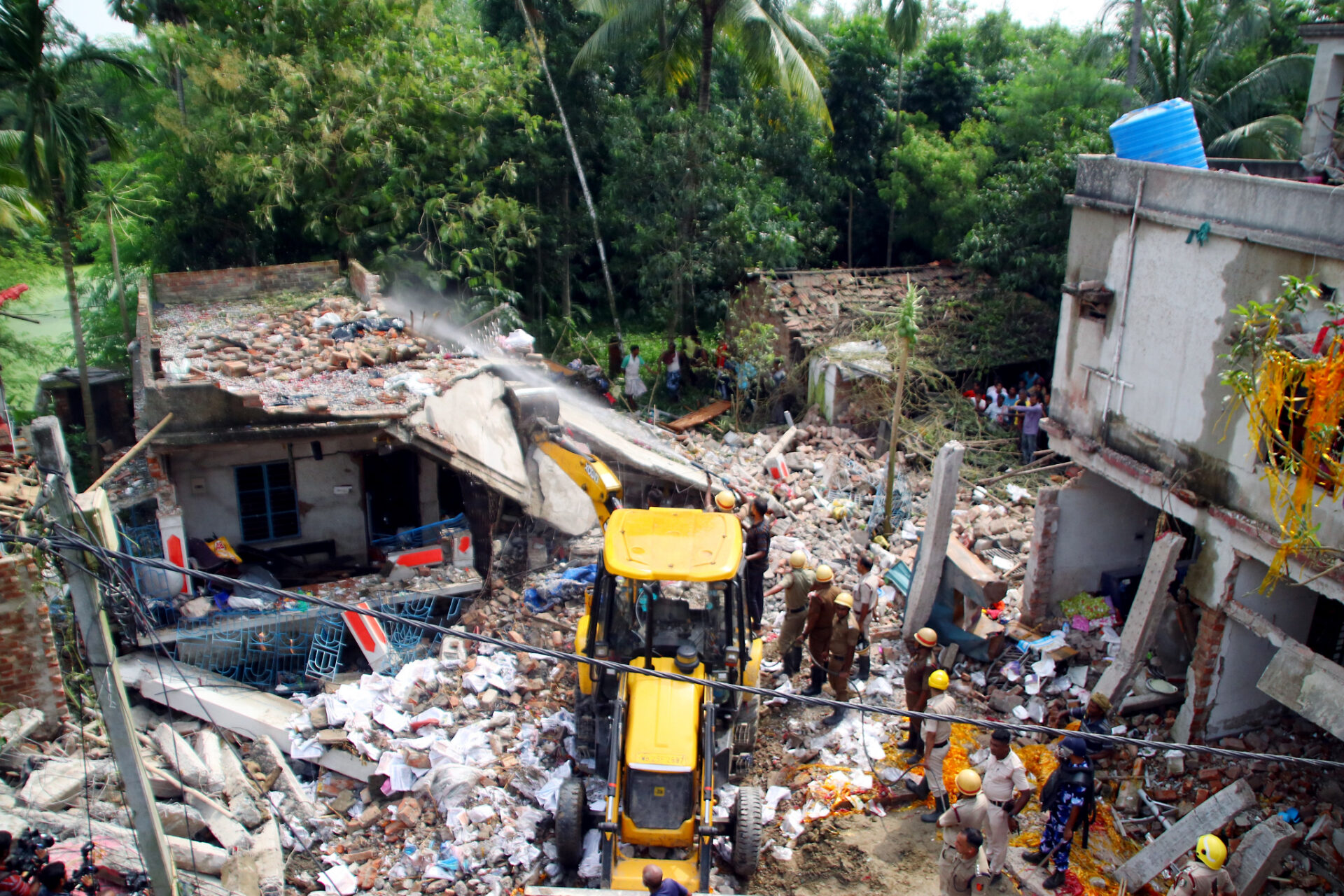KOLKATA
Last Sunday morning at about 10:15a.m., a powerful explosion rocked the residence of Trinamool Congress activist Ajibur Rahman in Nilganj village of Dattapukur, in the district of North 24-Parganas in West Bengal, instantly killing at least eight people.
Passersby on the road nearby were also knocked down. Adjacent houses began to collapse one after the other. The haze and dust generated by the explosion took nearly 20 minutes to settle. By that time, the concrete structure of the house had transformed into a heap of rubble. The force of the blast caused body parts of the factory workers to be scattered across rooftops of nearby houses, and some fragments even landed more than 100 meters away.
The blast at Duttapukur has ripped apart the West Bengal government’s repeated assertions that it was actively policing illegal “fireworks units” that have continued to thrive, defying Chief Minister Mamata Banerjee’s directive to crack down on such set-ups.
Since May, this marks the fifth incident of explosions in illicit “firecracker facilities” within West Bengal, claiming the lives of a total of 28 people. On 16 May, another explosion erupted in an unauthorised “firecracker factory” situated in Egra, Purba Medinipur district, resulting in the deaths of nine people.
Ten days after the Egra explosion, Mamata Banerjee made a public promise during her visit to the site that her government would take stringent measures against illicit “firecracker factories” and introduce the production of “green” fireworks.
However, rival political parties were quick to point out that what the administration was trying to pass off as mere unauthorised “fireworks units” were actually bomb-making units which thrived on the back of violence that marked elections. Congress leader Adhir Chowdhary said: “Before the panchayat elections, I had showed screenshots of how different Trinamool units were ordering bombs over WhatsApp. It was like home delivery by Swiggy and Zomato. These bomb-making factories are scattered across West Bengal with the active help and encouragement of the ruling party. That is why the police do not take any steps. Actually, the owners of these units, the police and the local TMC leaders work as a team.”
Sukanta Majumdar, the BJP’s state president, said: “This is Mamata Banerjee’s model of development. She has set up dozens of bomb-making factories across the state. That is why during the Panchayat elections, bombs were available in plentiful quantities across the state.”
An investigating officer said: “The reports point to storing of huge amounts of low intensity explosives, which are normally used in a very small quantity in making firecrackers, and other raw materials and chemicals in the house unsafely could have led to the massive blast. We suspect the explosives and chemicals were contaminated after being mixed with some fuel and triggered the blast.” Some experts, however, have raised questions about how low-intensity explosives could have blown off the concrete roof and pillars and hurled body parts so far. “Factors such as the amount, composition and type of explosive material, environment, delivery methods or the distance between the victim and the explosive device are all important elements in defining the pattern, as well as the extent of damage and casualties caused by an explosion,” said an expert of Central Forensic Science Laboratory (CFSL), Kolkata, a premier forensic institution under the aegis of the Intelligence Bureau, Ministry of Home Affairs.
“In the aftermath of the blast in Egra, police stations were instructed to carry out a special drive against illegal cracker units following orders from the Chief Minister,” said a senior police officer at the headquarters in Calcutta. “Among several places where such units were raided was Duttapukur where a huge quantity of explosives was recovered. This blast comes within three months of that recovery.” Mamata Banerjee had said that the Egra blast could have been averted if “the intelligence had worked properly.” Senior officers said with Duttapukur, there was no shortage of intelligence but officers in the Barasat Sadar subdivision chose to gloss over the inputs. P.K. Ghosh, former head of the Central Forensic Science Laboratory in Calcutta said: “Given the nature of an explosion where a concrete pillar has been twisted, it appears there was a ‘detonation’—a phenomenon where a high volume of organic chemicals goes off in a small place creating huge pressure.”
“We suspect that chemicals such as ammonium nitrate and potassium chlorate were being stored in warehouses in the Duttapukur area. We also found that stone chips [also used in crude bombs] were being stored in some of the godowns,” a senior officer from Barasat police said. Workers from Murshidabad were employed at the unit which flourished despite protests from a section of local residents, senior police officers have learnt.
“The local police station has to be aware of the illegal fireworks unit because of the presence of a group of migrant workers in a small pocket where a huge stock of explosives is kept in a house for commercial purposes,” the senior police officer said. “The police chose to gloss over it.”
The officer also said that the police have seized around 1,600 kg of illegal firecrackers from several godowns in Dattapukur. “Huge quantities of illegal firecrackers were stacked in warehouses and garages. Raids are continuing in the area,” the officer added. “We have seen how crude bombs are used in political clashes and riots. These illegal units are used to prepare the bombs,” Nazrul Islam, a retired IPS officer, said.
Trinamool’s chief spokesman Kunal Ghosh said: “In both Egra and Duttapukur, villagers were compelled to engage in unlawful activities out of desperation due to the stoppage of MGNREGA funds by the Union government. So, the Central government has to take the blame for these deaths.”

